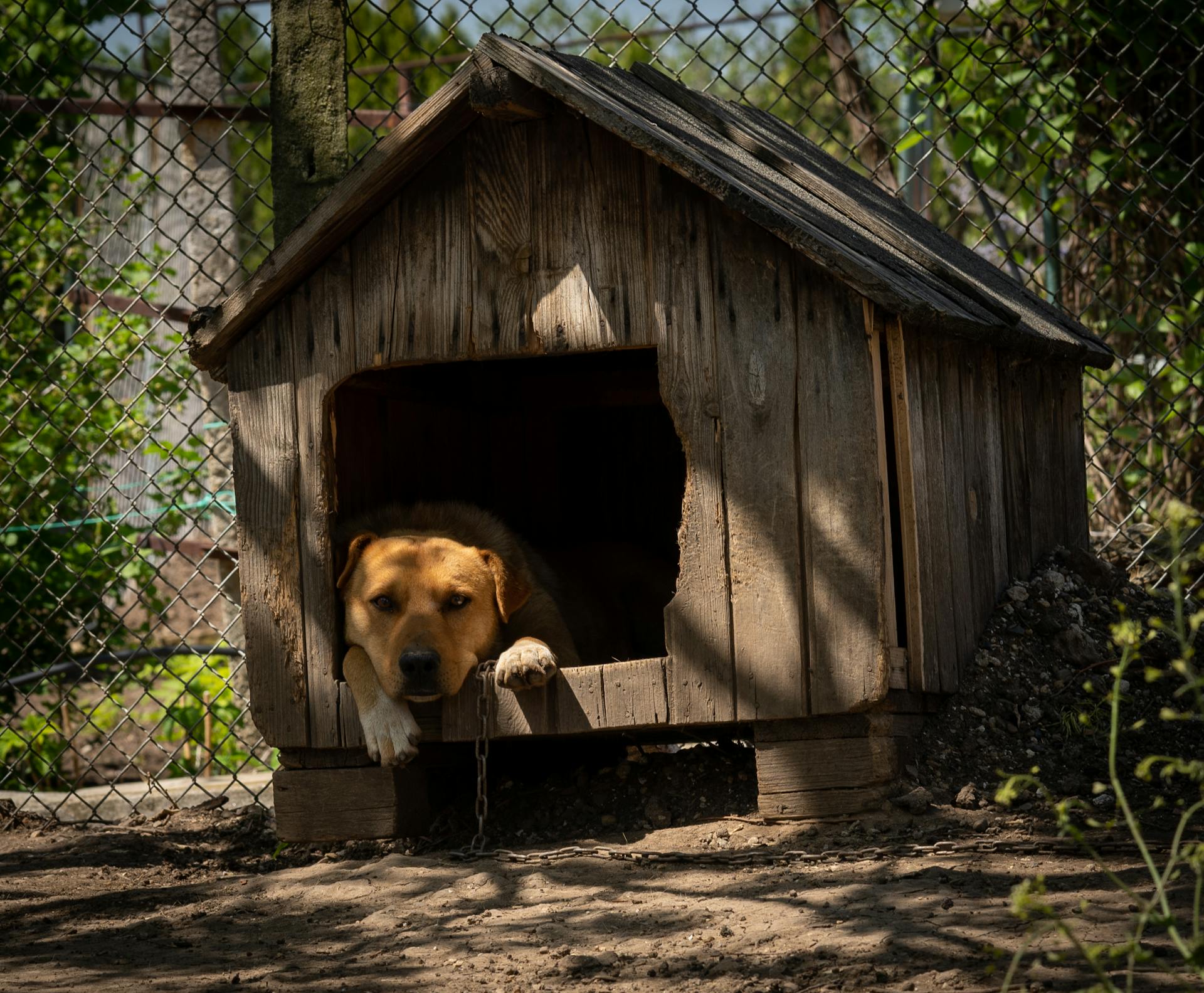
Dog parks can be a great place for your furry friend to socialize and get some exercise, but they can also be breeding grounds for diseases. Parvovirus, also known as parvo, is a highly contagious and potentially life-threatening disease that can be spread through contact with an infected dog's feces.
Parvovirus can be found in dog parks, as well as in other areas where dogs frequent, such as pet stores and veterinary clinics. It's a good idea to keep your dog up to date on their vaccinations, especially if they visit dog parks regularly.
Parvo can be fatal if left untreated, but prompt veterinary care can greatly improve the chances of recovery.
Discover more: East Bay Dog Parks
Parasites and Infections
Parasites are common in dog parks, with over 21% of dogs shedding parasites, according to a study by Oklahoma State and Idexx.
Hookworms, whipworms, and Giardia species are the most common parasites found in dog parks, with some dogs also infected with roundworms, coccidia, or tapeworms.
Intriguing read: Dog Parks Helpful
The South has the highest rates of positive tests for hookworms, affecting 15% of dogs and 72% of parks, with Miami having a particularly high prevalence.
Giardia species do well in water, which is why many dog parks with wading pools, sprinklers, or splash pads had high Giardia prevalence, with positive samples from about 13% of dogs and about three-quarters of parks.
Dogs on heartworm preventives have lower hookworm prevalence, at 6% rather than almost 12% of all dogs, and most of the dogs positive for hookworms were antigen positive only and not shedding eggs.
Parasites can travel with dogs, which is why it's essential to take precautions when visiting dog parks, especially in areas with high parasite prevalence.
On a similar theme: Why Does a Female Dog Hump a Male Dog
Health Risks and Precautions
Dog parks can be a great place for dogs to socialize and get exercise, but they also come with some health risks. Canine respiratory illnesses tend to spread fastest in places like dog parks, where dogs are sharing air and potentially coming into contact with each other's droplets.
Expand your knowledge: Are Service Dogs Allowed in National Parks
Vaccinations are a must for protecting your dog from respiratory diseases. Vets recommend having your dog vaccinated for Bordetella, canine parainfluenza, canine influenza, and canine adenovirus type 2, which are all relatively safe and effective.
Off-leash dog parks can be a high-risk activity for your dog's health, especially if they're socializing with other dogs. An off-leash dog park where dogs can run around and lick each other's faces is a breeding ground for respiratory illnesses.
Fecal-oral transmission is another risk at dog parks, where dogs can pick up parasites like Giardia and whipworms. However, the risk from fecal exposure is likely very low, and most experts agree that it's not worth panicking about.
Dog fouling is a common concern at dog parks, where owners often fail to clean up after their pets. This can lead to slips, falls, and injuries, as well as the transmission of zoonotic agents.
Proper disposal of dog waste is crucial at dog parks. If owners can't be bothered to clean up after their pets, the risk of spreading intestinal parasite burdens is great.
As a responsible dog owner, it's essential to take precautions to protect your dog's health. This includes giving them heartworm disease prevention to reduce the risk of intestinal parasitic burdens, and monitoring their fecal examinations to catch any potential infections early.
Diseases and Symptoms
Parvovirus is a highly contagious and life-threatening disease that can be contracted by dogs at the park. It's caused by the parvovirus, which can be spread through contact with an infected dog's feces.
Leptospirosis is a bacterial disease that can be spread through contaminated water or soil at the park, and can cause symptoms like fever, vomiting, and diarrhea.
Rabies is a viral disease that's almost always fatal, and can be spread through a bite from an infected animal. It's essential to keep your dog up-to-date on their vaccinations.
Ringworm is a fungal infection that can be spread through direct contact with an infected dog, and can cause symptoms like hair loss and skin irritation.
Parasites like fleas, ticks, and worms can also be found at the park, and can cause a range of health problems for your dog. Regular grooming and parasite control measures can help prevent infestations.
A fresh viewpoint: Are Dogs Allowed in Smoky Mountain National Park
Treatment and Management
Intestinal parasite burdens can be treated with anthelmintic medications, but it's essential to follow up with fecal examinations to ensure the parasites are fully eliminated.
Monitoring patients through fecal examinations can inform pet owners if their pets are carrying parasitic burdens prior to going to dog parks or other facilities.
If your dog is diagnosed with a parasitic burden, treatment typically involves a course of medication, followed by a retest 12 to 14 days later to assess fecal egg counts.
Fecal centrifugation testing can also be used to detect parasites, and repeat treatment may be necessary if the parasites persist.
Proper handling and cleaning of shedding feces is crucial to prevent the spread of intestinal parasites, not just for pets but also for humans.
Antibiotics are not always the best solution for dog respiratory illnesses, such as kennel cough, as they can contribute to antibiotic resistance.
In some cases, antibiotics may be necessary if the illness progresses to pneumonia, but this is relatively rare.
It's essential to recognize the signs of possible parasite burdens or respiratory illnesses so that you can seek early treatment for your dog.
Zoonoses
Dogs can carry a variety of human pathogens, including Escherichia coli, Campylobacter jejuni, Salmonella spp., and Giardia lamdia. These pathogens can be transmitted to humans through contact with infected dogs or contaminated environments.
Some of the zoonotic agents that can be transmitted from dogs to humans include Brucellosis, Campylobacteriosis, Cryptosporidiosis, and Giardiasis. These are all serious health concerns that can cause a range of symptoms, from mild to severe.
In fact, a study in Calgary city parks found that 50% of canine fecal samples contained parasites, with 25% containing Giardia spp., 15% Cryptosporidium spp., and 17% Cystoisospora spp. The prevalence of parasite infection was positively associated with dogs visiting multiple parks, as well as off-leash activity.
Younger and older dogs appear to be at highest risk of shedding Campylobacter spp. According to a study of off-leash dog parks in South-Western Ontario, the prevalence of Salmonella, Giardia, and Campylobacter spp. in fecal samples was 1, 6, and 43%, respectively.
Recommended read: What Diseases Do American Dog Ticks Carry
Here's a list of some of the zoonotic agents that can be transmitted from dogs to humans:
- Brucellosis
- Campylobacteriosis
- Cryptosporidiosis
- Dermatophytosis (ringworm)
- Escherichia coli
- Echinococcosis
- Ehrlichiosis
- Giardiasis
- Leptospirosis
- Pasteurellosis
- Rabies
- Salmonellosis
- Sarcoptic mange
- Staphylococcus spp.
- Strongyloidosis
- Toxocariasis
It's worth noting that dog ownership has been investigated as a risk factor for zoonotic transmission. A study in the US found that dog ownership was associated with increased Toxocara seropositivity, and another study found that dog ownership was associated with an increased likelihood of Cryptosporidium infection in HIV-positive individuals.
Minimizing Harm and Aggression
Children are more susceptible to dog bites, being approximately 3-5 times more likely to experience them than adults.
Most dog bites occur in the home, with 66% of bites happening in the patient's own home or a home they were visiting, and only 19% in public places, including off-leash dog parks.
This means that even with precautions, dog parks may not be the primary concern when it comes to dog bites.
Minimizing Harm
Minimizing harm is crucial in any situation.
By being aware of the triggers that can lead to aggression, we can take steps to prevent it.

As discussed earlier, understanding the causes of aggression is key to minimizing harm.
In situations where aggression is likely to occur, having a clear plan in place can help prevent escalation.
For example, in the case of a school shooting, having a lockdown procedure in place can help minimize harm to students and staff.
Identifying and addressing underlying issues, such as mental health problems, can also help reduce aggression.
This can involve providing access to counseling services or other forms of support.
In the case of a workplace conflict, taking steps to address the underlying issues can help prevent further escalation.
This can involve providing training on conflict resolution or anger management.
See what others are reading: Stop Dog on Dog Aggression
Canine Aggression
Canine aggression is a serious concern, particularly in off-leash dog parks, where owners have limited control over their pets. However, studies have shown that the majority of dog bites occur in the home, not in public places like parks.
Children under 15 are more susceptible to dog bites, being 3-5 times more likely to experience them than adults. They're also more likely to experience severe bites involving the head, neck, and face.
A review of dog bite injuries in Australia found that 66% of injuries occurred in the patients' own homes or homes they were visiting, and only 19% occurred in public places. This suggests that owners should be taking extra precautions in their own homes to prevent dog bites.
Children may be more likely to experience dog bites because they're often more curious and don't understand dog behavior as well as adults do. This highlights the importance of teaching children how to interact with dogs safely.
Frequently Asked Questions
How common is Giardia in dog parks?
Giardia was found in 20% of dogs and is a common issue in dog parks. Enhanced detection methods have improved our understanding of this widespread problem.
Sources
- https://www.avma.org/javma-news/2020-10-01/study-finds-parasites-common-dog-parks
- https://todaysveterinarynurse.com/parasitology/dog-parks-and-parasite-exposure/
- https://www.curbed.com/article/mysterious-dog-illness-veterinarian-kennel-cough.html
- https://www.npr.org/sections/health-shots/2023/11/23/1214951367/could-a-funky-pathogen-be-sickening-dogs-scientists-search-for-clues
- https://www.ncbi.nlm.nih.gov/pmc/articles/PMC5830495/
Featured Images: pexels.com


